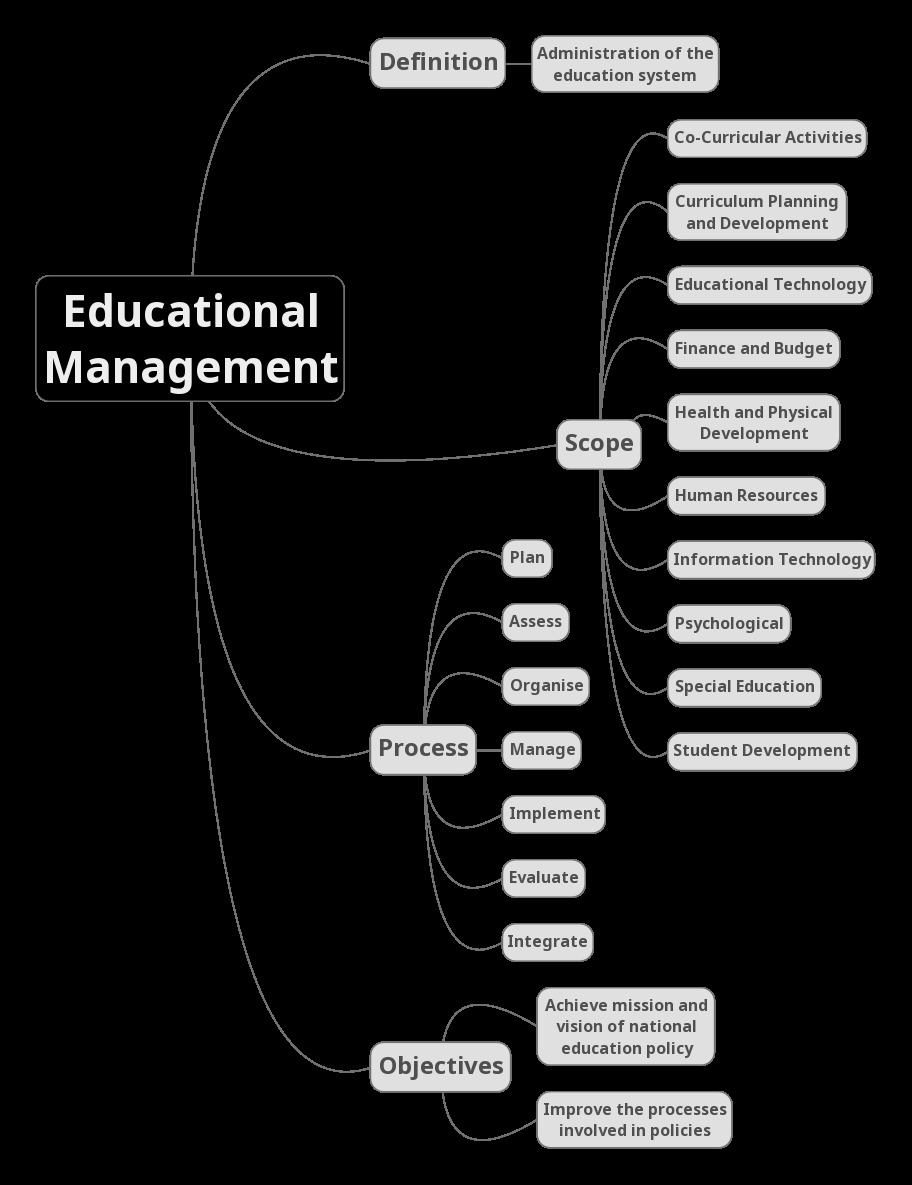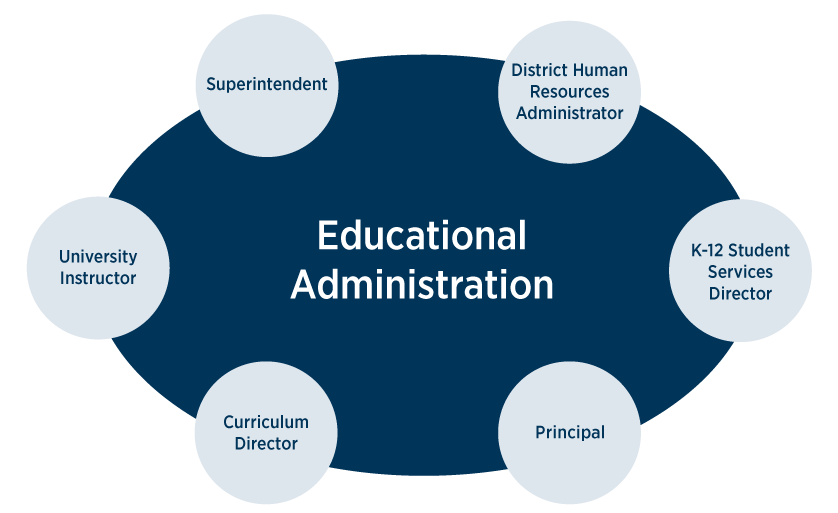Definition of Educational Administration – Educational administration is a form of effort to integrate existing activities and programs. This activity is interdependent with groups and individuals who have the same goals for the benefit of students.
The following is a further explanation of the existence of educational administration.
Definition of Educational Administration
The definition of educational administration is expressed by several experts as follows.
- Drs. M. Ngalim Purwanto stated that educational administration integrates educational goals personally, spiritually, and materially.
- The Ministry of Education and Culture of the Republic of Indonesia also defines education administration as all processes related to educational activities, including directing, planning, coordinating, financing, reporting, to supervision in the framework of covering education.
- Dasuqi and Somantri stated that education administration is an attempt to practice existing educational administrative principles.
- Hadari Nawawi revealed the education administration as a series of activities to achieve education and create systematic instruction.
- Good Carter V interprets educational administration as all the techniques and procedures used to administer educational institutions by predetermined policies.
- According to Knezevich, educational administration is a process that deals with creating, maintaining, stimulating, and unifying personnel in an educational institution to realize predetermined goals.
- Oteng Sutisna also stated that education administration is an effort to coordinate the interdependent activities of people and groups in achieving the common goal of children’s education.
- Nasution stated that education administration is the overall process of all joint activities in the field of education by utilizing all available facilities, personal, material, and spiritual, to achieve educational goals.
In addition, educational administration can also be interpreted as a collaboration to achieve academic goals, as well as processes to achieve academic goals, starting from planning, organizing, directing, monitoring, and evaluating. Educator administration can also be considered as a system with a whole consisting of interacting parts, with the aim of management to monitor whether it has achieved the set goals.
From a leadership perspective, educator administration functions to answer questions about how educational administrators carry out their duties, as well as a decision-making process between employees and a leader.
Meanwhile, regarding educational administration, communication attempts to make other people understand and vice versa. Educational administration can also be seen from an administrative perspective regarding routine note-taking activities, documenting activities, carrying out correspondence with all its aspects, and preparing reports.
The administration will support and expedite the teaching and learning process by paying attention to the components of education and the education system. In carrying out education administration, there will be many things that must be done. Not to mention related to social causes such as dropping out of school and problems regarding lack of character education.
Elements and Objectives of Educational Administration
According to Sondang P Siagian, several elements must exist in educational administration, such as having more than two people working on it, supported by tools and equipment.
According to The Liang Gie, the administrative elements are again different, including organization, management, communication, finance, supplies, staffing, administration, and public relations. These eight elements must exist in educational institutions, from elementary to tertiary levels.
According to Sergiovanni and Carver, administrative goals are seen as four primary plans emphasized in education: creating production effectiveness, efficiency, adaptability, and building job satisfaction.
In addition to these four objectives, the other objectives of educational administration are to achieve flexibility in the educational administration process, efficiency and effectiveness of the implementation of educational administration as well as the performance of continuity of education administration and lifelong education that is disciplined and guided by scientific linearity.
Educational administration is also responsible for forming and giving birth to quality and beneficial students for the nation and state. In addition to educating students, they produce faithful students, have good morals, and are independent and responsible. Please do not become a corrupt person because, in the end, it will harm society and the country.

The Role of Educational Administration
There are several roles of educational administration that we need to know as follows.
- Planning to achieve educational goals requires careful planning. The planning is made as best as possible to run optimally. Because educational planning is not done arbitrarily, it must be mutually agreed upon.
- Organizing is necessary for building good relationships and interactions with staff, between education and students. Therefore, they must work together to achieve the expected educational outcomes.
- Coordination must be based on good communication. If communication is not based on coordination, it will also have no impact. The team in the coordination section will be responsible for developing techniques, generating ideas, and how to create interactive learning.
If it is stagnant, then the management of educational institutions will also be uprooted. Students’ results will also fall apart due to the lack of maximum knowledge that has been given.
- Good communication is one way to establish connectivity between educators and students. Building communication is used to transform knowledge between educators and students; besides that, it is also a report on the results of educational attainment from regional units to central units.
- Supervision, as long as carrying out to achieve the goal, is necessary to have control. Because without charge, if there is a violation, they can be immediately reprimanded. A management structure is formed in each educational institution unit; if not monitored, the potential for fraud is very likely to occur.
- Staffing, commonly referred to as staffing, is responsible for planning and organizing. With staffing, the work structure will make it easier to achieve educational goals.
- Budgeting to run and achieve educational goals, there are exit costs and entry costs. So it takes budgeting that needs supervision. Because in the financial sector, there is a high risk of corruption by irresponsible people or persons.
- Assessment in an organization or educational institution will require transparency in the management process. One of them is evaluating whether it has been carried out effectively as a whole and achievements or not so that things that are lacking can be corrected.
To run an education is not easy because it requires many elements and elements that are integrated and related to one another. Many structures must be involved to achieve national education because it relates to the government and the world of education.
Principles and Functions of Educational Administration

The existence of a relationship between education providers and learning in schools raises the presence of several principles and functions of educational administration, namely as follows.
- Educational administration is a regulatory system for integrating all types and resources related to learning effectiveness toward achieving school academic goals. The Preamble of the 1945 Constitution emphasized that the purpose of the NKRI’s national education is to educate the nation’s life.
- There is the formation of a national education system with educational autonomy because the social reality of the Indonesian nation is multicultural. The national education autonomy system allows each school’s managerial learning process to run intensively, effectively, and efficiently.
- It is necessary to have a clear national education plan to achieve the elaboration of national education goals, with a development of the form of programs that will be concrete and structured. Implementation needs to be supported by an accurate organizing and coordinating system. This also requires an intensive monitoring system so that learning in schools can run effectively and efficiently to achieve the multi-competence target of human resources as an urgent national need.
- The existence of a vital function and role as a renewal of social life towards achieving national goals in the future.
The four main points of education administration need to be a basis for developing compelling education and learning management in schools. Besides that, it also requires consideration of the community’s psychological, anthropological, and sociological background in the school environment.
This is because the substance of spiritual, intellectual, and moral intelligence has become an educational goal that fosters behavior as a social psychological, anthropological, and sociological aspect. For the process to run smoothly, education and learning planning is needed that is clear and comprehensive. In addition, an effective and efficient implementation management system is also required.
Principles of Educational Administration
Two principles are used as the basis for educational administration activities in schools: the ideal principle and the operational principle.
Idiot Principle
On the ideal principle, educational administration in a country depends on the education system adopted. The education system adopted by the Indonesian state is an education system based on Pancasila and the 1945 Constitution.
Educational administration is a broad education sub-system, so the ideal basis used in school administrative activities is Pancasila and the 1945 Constitution.
Operational Principles
The second principle is operational, or the code used to achieve national education goals. As stated in the National Education System Law Number 20 of 2003, Indonesian schools’ education system has been renewed. This reform was carried out to improve the quality of education at the school level.
The principles used in the 2013 curriculum as the basis for operational administration are as follows:
1. Principle of Flexibility
Implementation of education in schools must pay attention to ecosystem factors and the ability to provide facilities to implement school education.
2. Principles of Efficiency and Effectiveness
Efficiency is not only in the proper use of time but also in optimal energy utilization.
3. Goal-oriented principles
Educational administration is a component of the education system, so to achieve this goal, the operational objectives that have been formulated must be the basis for implementing educational administration activities in schools.
4. Continuity Principle
It is the operational basis for carrying out administrative activities in schools. Because each level of education must have a mutually sustainable hierarchy.
5. The Principle of Lifelong Education
Every human being is expected to develop continually. Therefore, the community or government must create a situation supporting the teaching and learning process.
Educational Administration Tasks
The educational administration tasks are as follows:
- Strive for education to appear usually by formulating, completing, elaborating, and setting educational goals that will be formally concerned
- Disseminating and trying to instill educational goals in the members of the institution so that these educational goals become the needs and encouragement of the work of the members of the institution
- Choose, select, describe, and determine processes in the form of calculated actions, activities, and work patterns that provide results by the objectives set.
- Supervise the implementation of the educational process by monitoring, checking, and controlling every activity and action in every system process. This effort is often associated with inherent supervision or quality control in education.
- Assess the results that have been achieved and the processes that are currently in effect, in addition to striving for information regarding developments and methods to become feedback that can improve operations and outcomes in the future
Scope of Education Administration

There are several fields within the scope of educational administration, including:
School Administration Sector
- Administration organization and employee structure
- School finance budget
- Staffing and school personnel issues
- Finance and bookkeeping
- Correspondence or letters
- Appointments, transfers, placements, reports, filling out master books, report cards, and so on
Student Personnel Field
- Student organization
- Student health problems
- Evaluate student progress
- Student welfare issues
- Guidance and counseling for students
Teacher Personnel Field
- Appointment and placement of teachers
- Teacher person organization
- Employment issues
- The problem of conditions and evaluation of teacher progress
- Teacher refreshing and upgrading
Field of Supervision or Supervision
- Efforts to increase the morale of teachers and administrative staff.
- Strive for and develop cooperation between teachers, students, and administrative staff.
- Strive for and create guidelines for assessing educational and teaching outcomes.
- Efforts to improve the quality and experience of teachers.
Field of Curriculum Implementation and Development
- Guide and apply the school curriculum to achieve the basics and goals of education and teaching.
- Carry out curriculum organization and its methods by the renewal of education and the community environment.
Education Administration Components
Administrative components can be broadly classified into:
- School Personal Administration, the whole process of structuring personnel in schools consisting of school principals, vice principals, teachers, heads of administration, all administrative employees, and so on
- Curriculum Administration is all experiences schools provide to foster children’s development by creating teaching and learning situations.
- Education Infrastructure and Facilities Administration, for infrastructure such as locations or places, school buildings, and sports fields. Meanwhile, facilities are direct tools to achieve educational goals, such as rooms, books, libraries, laboratories, etc.
- Student Administration, such as Student Organisations, aims to train student leadership and provide a vehicle for students to carry out appropriate curricular activities.
- School and Community Cooperation, several paths can be taken in school-community relations, namely:
- Child or student
- School letters, flyers, and bulletins
- Mass media
- Informal meeting
- Student progress reports
- formal contract
- Utilize the resources available in the community
- Educational support agency
Very clearly, the vital role of administration in the sphere of education. Educational administration that is carried out correctly will undoubtedly support the achievement of educational goals for students.

